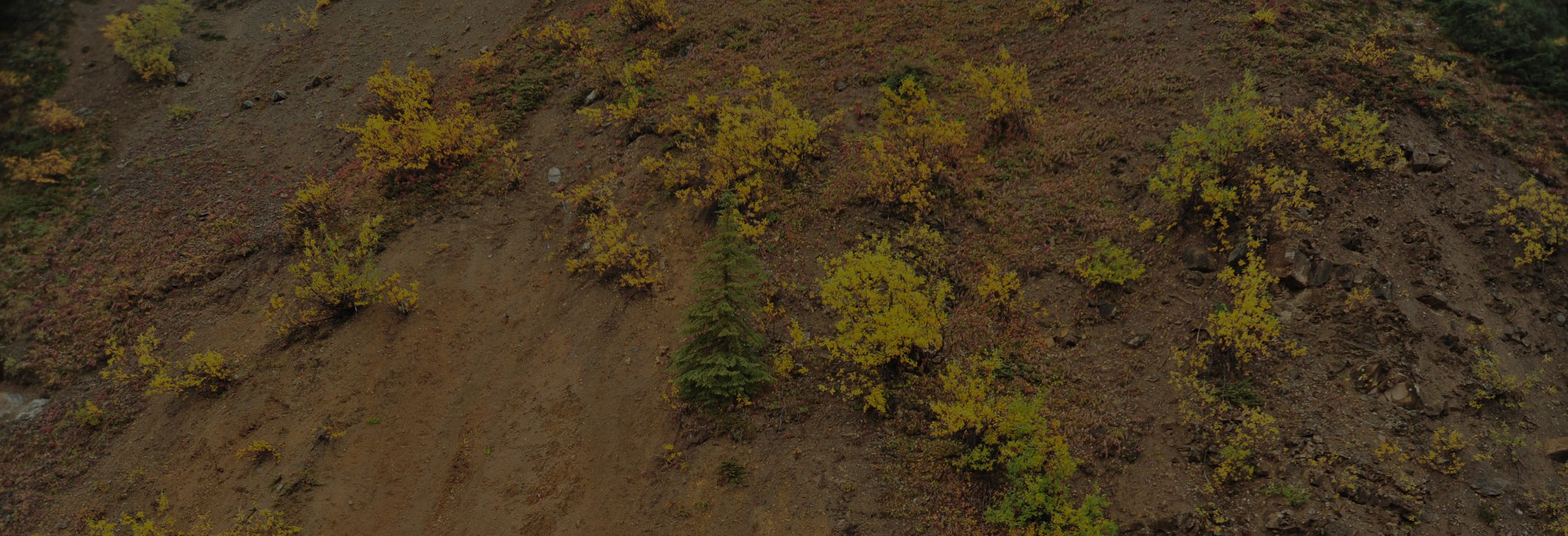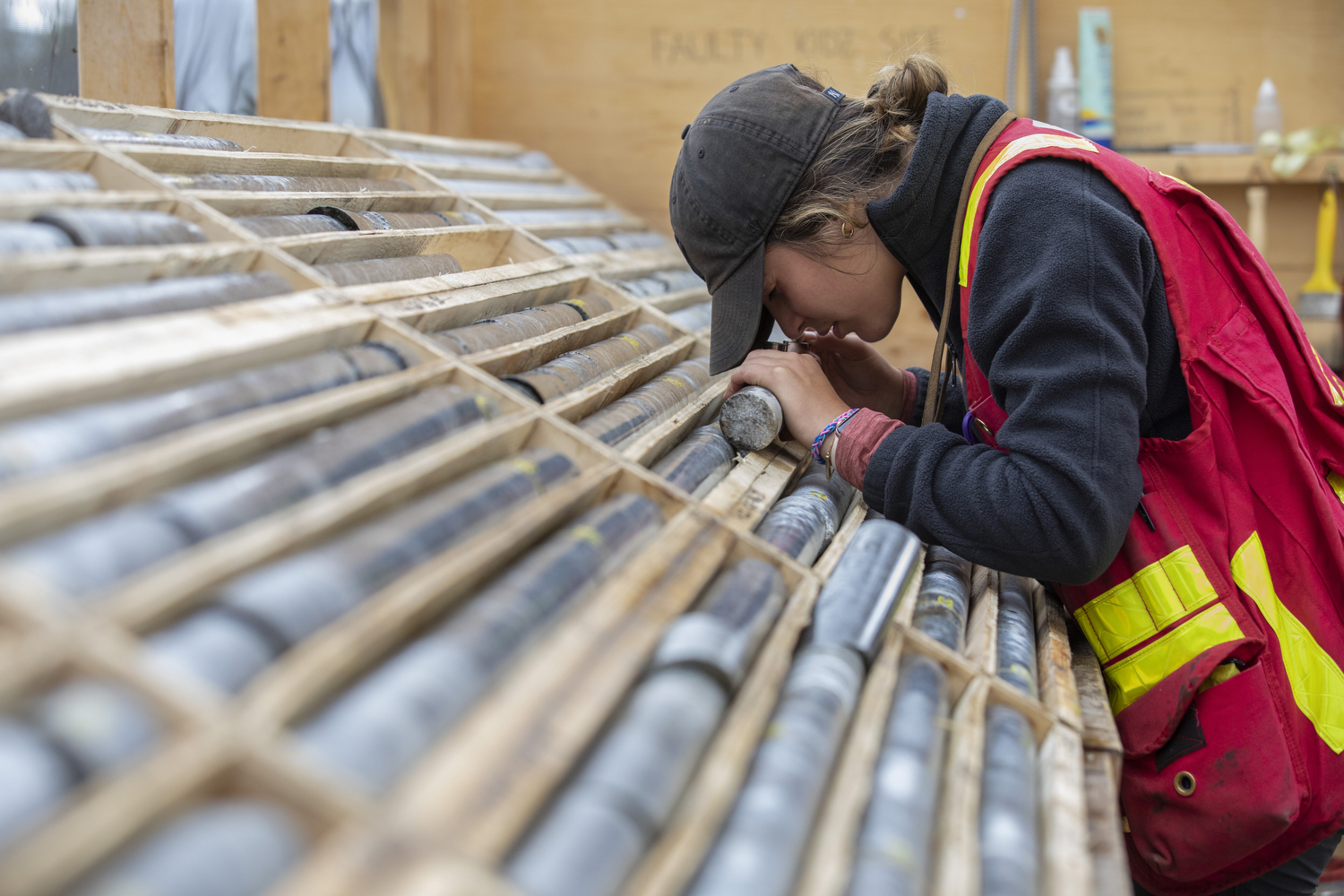- Hole V-23-039 returned 2.48 g/t Au over 553.8 m from surface including 4.98 g/t Au over 132.0 m from 6.0 m downhole demonstrating strong mineralization at surface and at depth near the western boundary of the Valley intrusion
- Hole V-23-037 returned 2.47 g/t Au over 383.8 m from surface including 4.06 g/t Au over 120.0 m from a collar location roughly 115 m across strike from V-23-039
- Results confirm and improve upon strong grade and continuity of well mineralized, near-surface corridor on the Rogue Project’s Valley target, while identifying a new zone of >2 g/t Au mineralization at depth along the western margin of the intrusion.
Vancouver, B.C., August 3, 2023: SNOWLINE GOLD CORP. (TSX-V: SGD) (OTC: SNWGF) (the “Company” or “Snowline”) is pleased to announce additional analytical results from its ongoing drill program at the Valley target on its Rogue Project in Canada’s Yukon Territory. Holes V-23-039 and V-23-037 returned the two strongest gold intersections from the project to date, demonstrating the presence of a high-grade, near-surface core to the gold system at Valley. Hole V-23-039 averages 2.47 g/t Au over 553.8 m from bedrock surface, including two distinct zones with multiple-gram-per-tonne gold mineralization, with a strong run of continuous mineralization at depth averaging 2.02 g/t Au over 233.0 m from 287.0 m downhole. Analytical results for an additional 19 holes (7,116 m) at Valley are pending, with drilling at Valley and other Rogue Project targets ongoing.
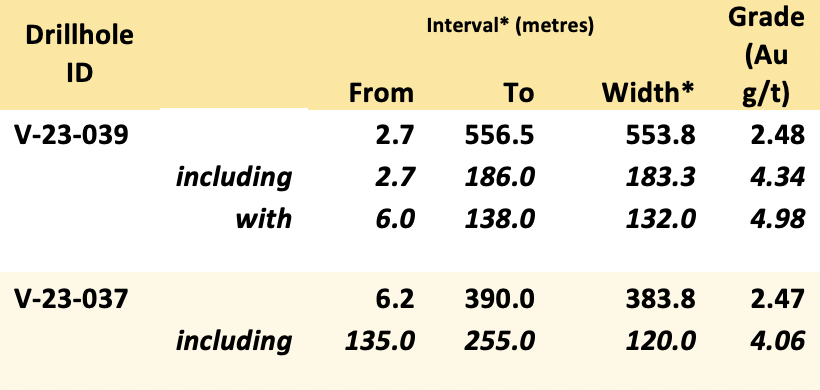
Table 1 – Highlight summary of Snowline’s latest assay results. *Interval widths reported; true widths of the system are not yet known.
“Drill hole V-23-039 is the best drill hole reported at the Rogue Project’s Valley target to date, and it ranks among the best drill holes ever drilled for gold in the Yukon. Along with V-23-037—which would have otherwise been the target’s best hole—it confirms and builds upon the strong continuity and grade of the Valley gold discovery across significant distances beginning at surface. The grades are exceptional for a reduced intrusion-related gold system, where resource grades for most known deposits are well below 1 g/t Au. With high gold recoveries from non-refractory metallurgy, a conducive geometry for a low strip ratio, and its location in a favourable mining jurisdiction, the Valley target is emerging as one of the recent gold discoveries on a global scale. Drilling is ongoing at Valley and on other potentially similar gold targets elsewhere on our 100%-owned, 94,000 ha Rogue Project.”
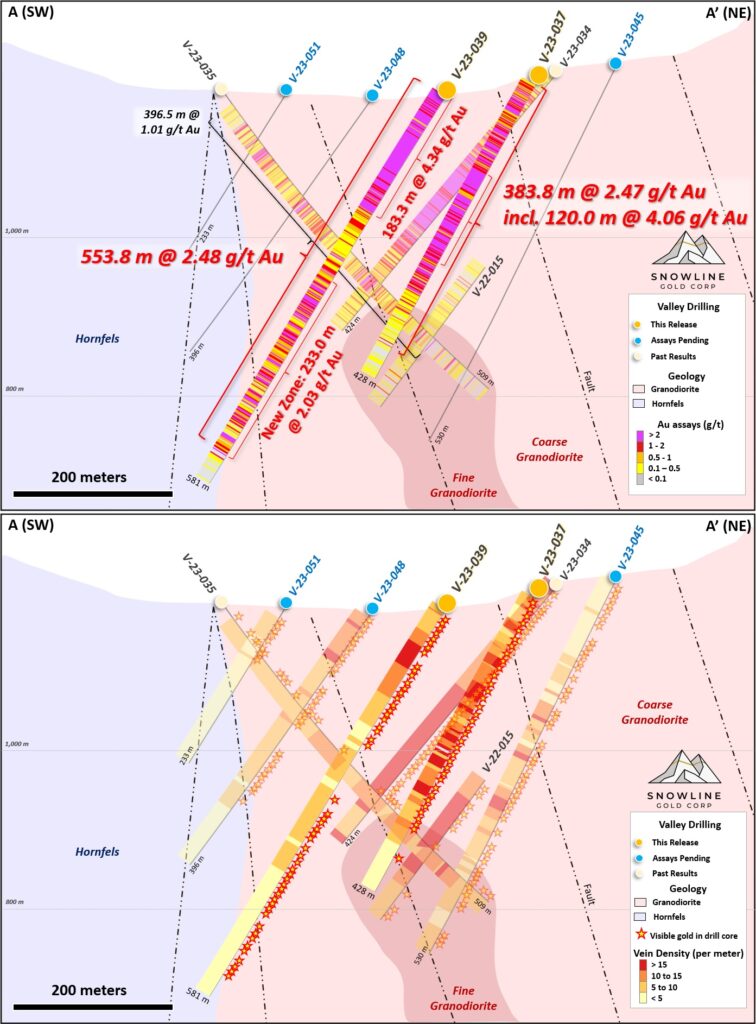
Figure 1 – Cross-section A, highlighting remarkable continuity of strong, near-surface gold grades encountered at Valley. Top: Analytical results received to date and still pending (thin black lines). Bottom: Vein densities alongside instances of visible gold observed during logging. Note that V-22-034 and 035 actually sit in the foreground of the section—V-23-037 and 039 are herein plotted without interruption to highlight the recent results. Two phases of the Valley intrusion are shown, along with fault traces.
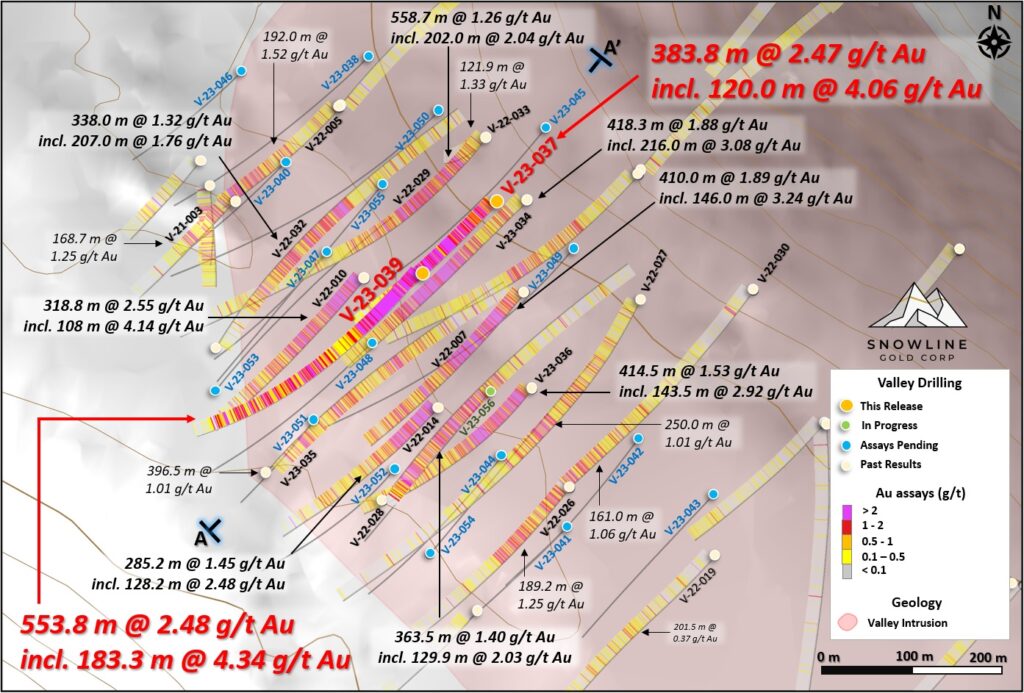
Figure 2 – Plan view of the Rogue Project’s Valley target showing analytical results from previous and current drilling, along with approximate traces of current holes. The high level of consistency of mineralization can be seen in the distribution of assay values down holes. Hole V-23-039 returned a similar length mineralized intersection from surface to that of V-22-029—a downhole length roughly equivalent to the height of Toronto’s CN Tower—but at double the grade. Results from the Valley target consistently carry unusually high grades for a reduced intrusion-related gold system.
HOLE V-23-039
Hole V-23-039 is collared within the Valley intrusion and tests a large gap within previous drilling on the near-surface, >2 g/t Au corridor discovered at Valley in 2022. The hole is roughly 64 m east of the nearest hole, V-22-010 (318.8 m @ 2.55 g/t Au including 108.0 m @ 4.14 g/t Au from surface, see Snowline news release dated October 12, 2022), and 117 m west of V-22-007 (410.0 m @ 1.89 g/t Au from surface including 146.0 m @ 3.24 g/t Au, see Snowline news release dated November 15, 2022). It is 115 m across strike and to the southwest of V-23-037 (428.0 m @ 2.47 g/t Au from surface including 120.0 m @ 4.06 g/t Au, this release).
As with previous drill holes in this zone, V-23-039 intersects abundant sheeted quartz veins in granodiorite, with multiple generations of gold-bearing quartz veins. Mineralization is continuous throughout the top 553.8 m downhole from surface, averaging 2.47 g/t Au across this length. Two zones of higher-grade mineralization are present within this interval: 4.34 g/t Au over 183.3 m from bedrock surface at 2.6 m downhole, and 2.03 g/t Au over 233.0 m from 287.0 m downhole, separated by a zone of lower grades averaging 0.83 g/t over 101.0 m from 186.0 m downhole.
The upper zone of mineralization confirms continuity of strong, near-surface mineralization encountered in earlier holes, albeit with higher overall gold grades than previously encountered at Valley. Within the top 180.0 m downhole from bedrock surface at 2.7 m, 148 out of 177 samples assayed higher than 2.0 g/t Au—representing 148.3 m (non-contiguous) or 84% of the downhole interval. Only six samples, representing 6.0 m (non-contiguous) assayed below 1 g/t Au.
The lower zone of mineralization (2.03 g/t Au over 233.0 m from 287.0 m downhole) represents a newly discovered zone of >2 g/t gold mineralization along the western margin of the Valley intrusion at depth. Quartz veins in this zone are intersected at lower angled to drill core, as has previously been seen in drilling along the western boundary of the intrusion. The hole exits the intrusion into lightly mineralized hornfels at 535.4 m downhole, but the zone itself remains open in multiple directions along the edge of the intrusion.
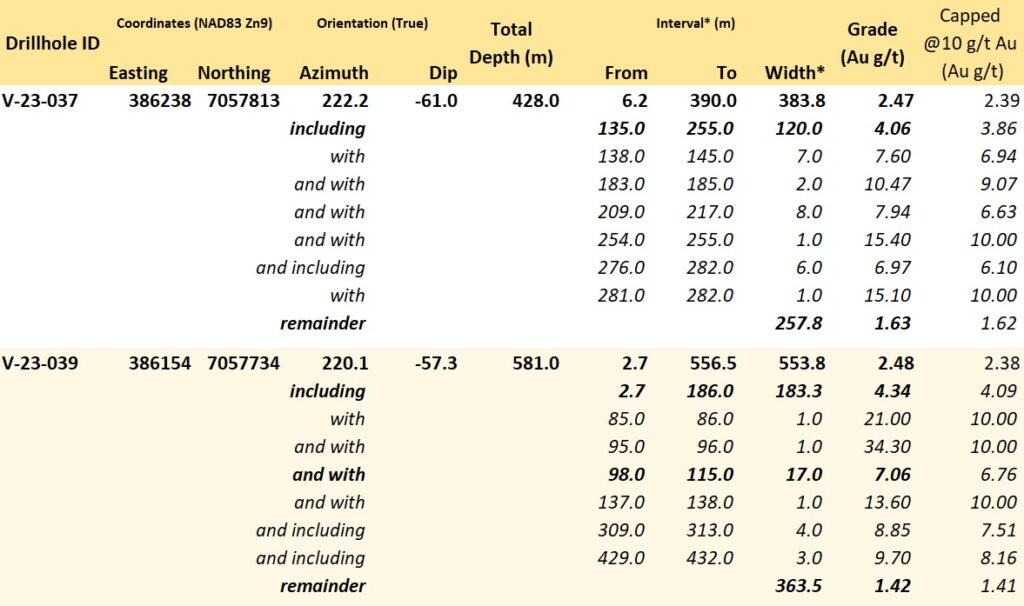
Table 2 – Summary of mineralization observed in current holes. The consistency of strong mineralization is reinforced by the capped values in the rightmost column, wherein any assay result >10 g/t Au is replaced by 10.0 g/t Au to calculate the average interval grades. The high results demonstrate uniform gold mineralization that is not “smeared” across a given interval by isolated high-grade samples. *Interval widths reported; true widths of the system are not yet known, with different vein generations, orientations, and grade distributions present within various intervals through the bulk tonnage gold target at Valley.
HOLE V-23-037
Hole V-23-037 is collared within the Valley intrusion, 115 m northeast of V-23-039 (553.8 m @ 2.48 g/t Au, this release). As with nearby hole V-23-034, (418.3 m @ 1.88 g/t Au from surface including 216.0 m @ 3.08 g/t Au, see Snowline news release dated July 5, 2023) collared 34 m to the east to provide information on small-scale variance within the system, the hole intersected abundant sheeted quartz veins within the intrusion, in places carrying trace amounts of visible gold. Gold grades and distribution in the two holes is quite similar, except that in V-23-037 higher grades begin at surface, and they continue to greater downhole and vertical depths than in V-23-034. The hole ends in patchy lower grade mineralization within a fine-grained, porphyritic phase of the granodiorite (Figure 1).
Mineralization within V-23-037 is robust and consistent, averaging 2.47 g/t Au over 383.8 m from bedrock surface at 6.2 m downhole, with a higher-grade zone averaging 4.06 g/t Au over 120.0 m from 135.0 m downhole. If not for V-23-039, this hole would have been the best drilled to date within the Valley intrusion. Capping grades at 10.0 g/t Au reduces the average grade of mineralization within the broader interval only 3.1% to 2.39 g/t Au.
EXPLORATION UPDATES
Valley Target Drilling, Rogue Project
The 10,000+ m drill program at the Rogue Project’s Valley discovery is ongoing, with two drill rigs active on site. To date, >9,500 m has been drilled on the Valley target in 2023, with 22 holes completed and an additional 2 holes in progress. Analytical results for all but 5 holes drilled at Valley in 2023 are pending. The Company intends to continue drilling at Valley until the end of the exploration season in early October.
Satellite Target Drilling, Rogue Project
Phase II drilling at the Rogue Project’s Gracie target was temporarily deferred due to unstable terrain, with G-23-006 shut down at 276 m downhole depth within hornfels.
Drilling has instead commenced at the Rogue Project’s Reid target, where LM-23-001 has intersected a poly-phase intrusive system, with a coarse-grained granodiorite phase and a fine-grained porphyritic phase, and moderate to low vein densities. Five instances of trace visible gold have been observed in the hole. The Company notes that its re-analysis of historical drill core material from Reid did not replicate the highest gold values reported from historical hole AS-96-03.
Preparations are also underway for a Phase I drill program at the Rogue Project’s Cujo target.
Southwest Yukon Drilling
A phase I program of five drill holes totalling 1,283 m is complete at Snowline’s 100% owned Cliff Project, and the drill rig has been mobilized off site. Analytical results for all holes at Cliff are pending.
The same drill rig has been mobilized to the Tosh Property, where drilling has commenced on a 4+ hole, 1,200+ m Phase I program focused on the “Yarrow” gold-silver target. This is the first ever drill testing of the Tosh Property.
QA/QC
On receipt from the drill site, Valley’s NQ2-sized drill core was systematically logged for geological attributes, photographed and sampled at Snowline’s 2023 field camp. Sample lengths as small as 0.5 m were used to isolate features of interest, but most samples within moderate to strong mineralization were 1.0 m in length; otherwise, a default 1.5 m downhole sample length was used. Core was cut in half lengthwise along a pre-determined line, with one half (same half, consistently) collected for analysis and one half stored as a record. Field duplicates were collected at regular intervals as ¼ core samples by splitting the ½ core sent for sampling, leaving a consistent record of half core material from duplicate and non-duplicate samples alike. Standard reference materials and blanks were inserted by Snowline personnel at regular intervals into the sample stream. Bagged samples were sealed with security tags to ensure integrity during transport. They were delivered by expeditor to Bureau Veritas’ preparatory facility in Whitehorse, Yukon. Sample preparation was completed in Whitehorse, with analyses completed in Vancouver.
Bureau Veritas is accredited to ISO/IEC 17025 and ISO9001 for quality management. Samples were crushed by BV to >85% passing below 2 mm and split using a riffle splitter. 250 g splits were pulverized to >85% passing below 75 microns. A four-acid digest with an inductively coupled plasma mass spectroscopy (ICP-MS) finish was used for 59-element analysis on 0.25 g sample pulps (BV code: MA250). All samples were analysed for gold content by fire assay with an atomic absorption spectroscopy (AAS) finish on 30 g samples (BV code: FA430). Any sample returning >10 g/t Au was reanalysed by fire assay with a gravimetric finish on a 30 g sample (BV code: FA530).
All standard reference materials and blanks inserted into the sample streams for the two holes returned values within acceptable limits.
ABOUT ROGUE
The Valley target on Snowline’s flagship Rogue Project is a newly discovered, bulk tonnage style, reduced intrusion-related gold system (RIRGS), with geological similarities to multi-million-ounce deposits currently in production such as Kinross’s Fort Knox Mine in Alaska and Victoria Gold’s Eagle Mine in the Yukon. Early drill results demonstrate unusually high gold grades for such a system, present near surface across drill intersections of hundreds of metres. Gold is associated with bismuthinite and telluride minerals hosted in sheeted quartz vein arrays within and along the margins of a one-kilometer-scale, mid-Cretaceous aged Mayo-suite intrusion. Valley is an early-stage exploration project without a resource estimate, and while initial results are encouraging, the presence or absence of an economically viable orebody cannot be determined until additional work is completed.
The Rogue Project area hosts multiple intrusions similar to Valley along with widespread gold anomalism in stream sediment, soil and rock samples. Elsewhere, RIRGS deposits are known to occur in clusters. The Rogue Project is thus considered by the Company to have district-scale potential for additional reduced intrusion-related gold systems.
ABOUT SNOWLINE GOLD CORP.
Snowline Gold Corp. is a Yukon Territory focused gold exploration company with an eight-project portfolio covering >333,000 ha. The Company is exploring its flagship >94,000 ha Rogue gold project in the highly prospective yet underexplored Selwyn Basin. Snowline’s project portfolio sits within the prolific Tintina Gold Province, host to multiple million-ounce-plus gold mines and deposits including Kinross’ Fort Knox mine, Newmont’s Coffee deposit, and Victoria Gold’s Eagle Mine. The Company’s first-mover land position and extensive database provide a unique opportunity for investors to be part of multiple discoveries and the creation of a new gold district.
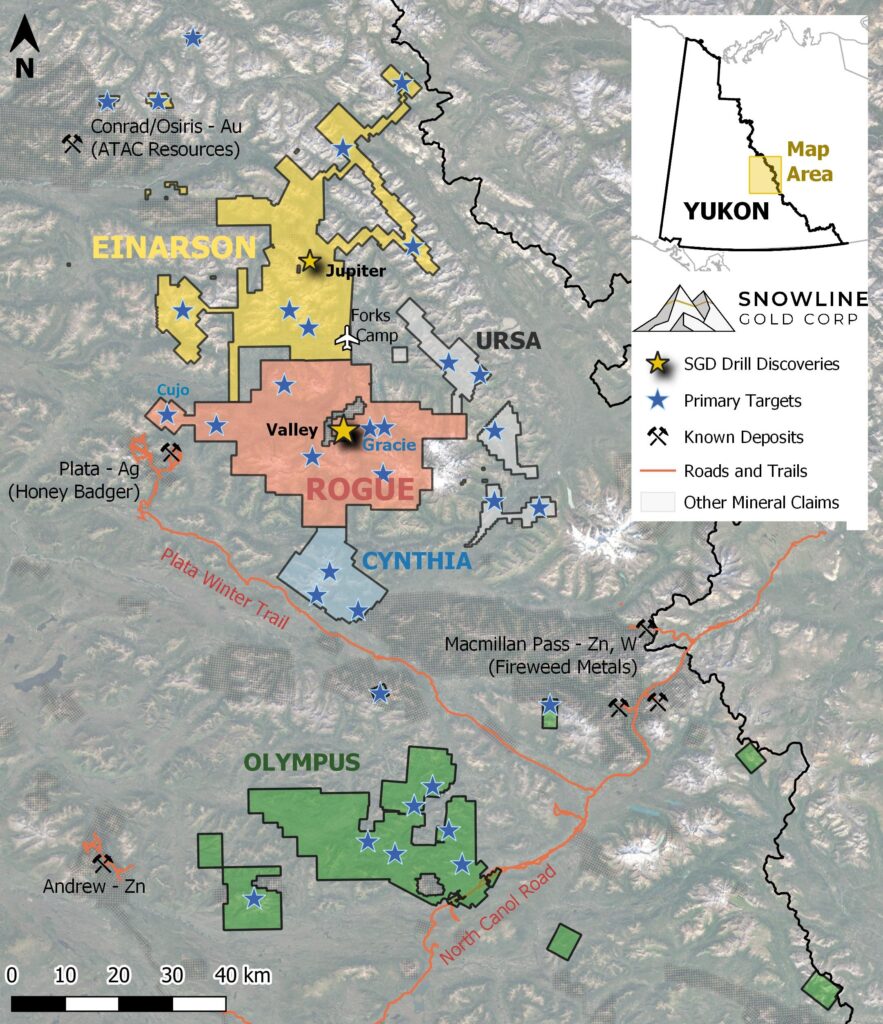
Figure 3 – Project location map for Snowline Gold’s eastern Selwyn Basin properties: Rogue, Einarson, Ursa, Cynthia and Olympus. The current work program at Rogue is based from the Company’s Forks Camp.
QUALIFIED PERSON
Information in this release has been prepared under supervision of and approved by Thomas K. Branson, M.Sc., P. Geo., Vice President of Exploration for Snowline Gold as Qualified Person for the purposes of National Instrument 43-101.
ON BEHALF OF THE BOARD
Scott Berdahl
CEO & Director
For further information, please contact:
Snowline Gold Corp.
+1 778 650 5485
info@snowlinegold.com
CAUTIONARY NOTE REGARDING FORWARD-LOOKING STATEMENTS
This news release contains certain forward-looking statements, including statements regarding the significance of analytical results, the discovery potential within the Valley intrusion, the potential for investors to participate in multiple future discoveries, the Rogue project having district-scale prospectivity, the creation of a new gold district and the Company’s future plans and intentions. Wherever possible, words such as “may”, “will”, “should”, “could”, “expect”, “plan”, “intend”, “anticipate”, “believe”, “estimate”, “predict” or “potential” or the negative or other variations of these words, or similar words or phrases, have been used to identify these forward-looking statements. These statements reflect management’s current beliefs and are based on information currently available to management as at the date hereof.
Forward-looking statements involve significant risk, uncertainties and assumptions. Many factors could cause actual results, performance or achievements to differ materially from the results discussed or implied in the forward-looking statements. Such factors include, among other things: risks related to uncertainties inherent in drill results and the estimation of mineral resources; and risks associated with executing the Company’s plans and intentions. These factors should be considered carefully, and readers should not place undue reliance on the forward-looking statements. Although the forward-looking statements contained in this news release are based upon what management believes to be reasonable assumptions, the Company cannot assure readers that actual results will be consistent with these forward-looking statements. These forward-looking statements are made as of the date of this news release, and the Company assumes no obligation to update or revise them to reflect new events or circumstances, except as required by law.
